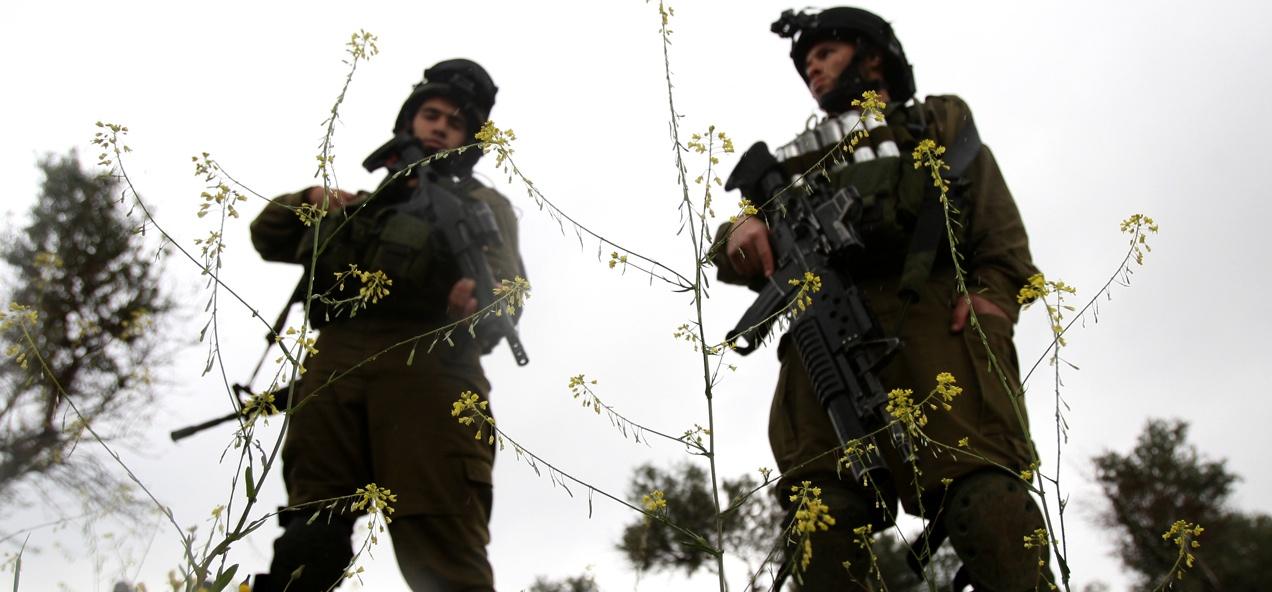The Oscars shine spotlight on Israeli treatment of Palestinians
Israeli soldiers stand guard during the weekly demonstration against Israel’s controversial separation barrier in the village of Bilin, near the West Bank city of Ramallah.
JERUSALEM — Not one but two Israeli-made documentaries are finalists for an Oscar this Sunday. But instead of being a cause for celebration, both movies are giving the state's prime minister, Benjamin Netanyahu, a stomachache.
"The Gatekeepers," a glossy and accomplished production, includes one of Netanyahu's cabinet members among its stars. Avi Dichter, the current minister of Homeland Security, appears as one of six former directors of Israel's General Security Service, the storied Shin Bet, who agreed to be interviewed by director Dror Moreh on the subject of the occupation of Gaza and the West Bank of the Jordan River, territories Israel gained after winning the Six Day War in 1967.
The second film, "5 Broken Cameras," addresses one of the codicils of that same occupation. Emad Burnat, an olive farmer from the West Bank town of Bil'in, bought his first camera to document the birth of his fourth son, Gibreel. One day, surveyors come to take measurements of his land, part of which the Israeli government is seizing under eminent domain statutes in order to build a security wall between Israel and the Palestinian Territories, and keep terrorists at bay.
Burnat begins documenting the seizures and the ensuing protests and conflict (to this day, Bil'in is the site of weekly confrontations between Israeli security officials and Israeli and Palestinian peace activists.) The documentary was filmed entirely on small hand-held digital cameras; one by one, his cameras are broken in clashes and altercations even as his spirit and his commitment to activism are awakened. It has been compared to the best of Italian cinema verité.
Burnat is the first Palestinian to be nominated for an Oscar. His Israeli co-director, Guy Davidi, who wrote the movie, secured funding from Israeli and international film foundations.
Since Oscar nominations have been announced, Israelis have been mulling over the entwined stories exposed by these two films, combined with pride, sometimes bittersweet, at the achievement they represent.
"The fact the film has gotten to the Oscar ceremony in the USA is a certificate of honor for Israeli film and for the film itself, and for everyone who worked on it,” Moreh, "the Gatekeepers'" director, said in a conversation with GlobalPost.
"The Gatekeepers" is a journalist tour de force. Moreh, the director, managed an unprecedented feat in securing interviews with each of the living former Shin Bet directors, all of whom reveal an astonishingly unanimous opinion about the futility of Israel's occupation of the Palestinian territories. "We win every battle and are losing the war," one of them says, though he could be speaking for all of them.
Another almost blanket judgment revealed by the film is that the Israeli extreme right wing is more dangerous to the future of the Israeli state than any Arab threat.
"I think something poetic, if we can say 'poetic' about a documentary, that the film's only interviewees are six former Shin Bet directors and each of them clearly says the occupation must end,” Moreh said. “They don't think it's an easy mission, they don’t think the Palestinian partner is easy, but they all think it’s the No. 1 interest of Israel to get there."
A stretch of the film analyzing radical religious Jewish extremists shows stomach-turning clips from 1994 and 1995, in which right wing activists call for the murder of then-Prime Minister Yitzchak Rabin. In some, then-opposition leader Benjamin Netanyahu appears clapping from a balcony. In Israeli theaters, the silence is deepest during these scenes.
In a series of interviews following the film's release last month, Moreh accused Netanyahu of being complicit in Rabin's 1995 assassination.
"Yigal Amir, the assassin, is in jail, but I think much of the perpetrators, of the people who sent him, the extreme right-wing rabbis, those politicians who were also there, are as much to blame as the one that pulled the trigger," Moreh told CNN.
According to his spokesman, Netanyahu has not seen the movie.
In an interview with GlobalPost, Moreh said he had, "no interest in Benjamin Netanyahu when I did this film. He never really interested me. He's just a politician who I hope will vanish quickly. I made the movie to create a mirror image of Israeli society, to look deeply at Israeli society today, the issue of war and the Palestinian-Israeli conflict and what it continues to do to our society."
The Israeli-Palestinian appearance at the Oscars got off to a bumpy start when Burnat, the Palestinian director of "5 Broken Cameras" was briefly held for questioning at Los Angeles airport upon landing.
Interviewed by Current TV, Burnat said the experience reminded him of home — in all the wrong ways. "What's happened to me in the Los Angeles airport reminds me of where I live and where I come from, because I get this treatment in my country [from] the Israeli army,” he said.
Every day, reporters and producers at The World are hard at work bringing you human-centered news from across the globe. But we can’t do it without you. We need your support to ensure we can continue this work for another year.
Make a gift today, and you’ll help us unlock a matching gift of $67,000!
